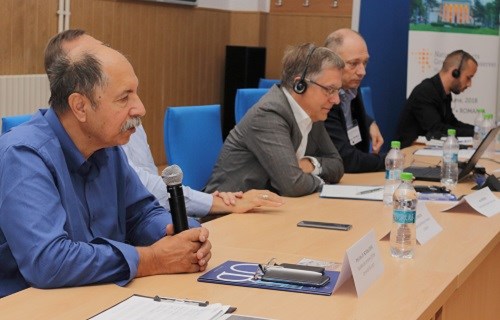From good governance towards a new vision for sports

Mihai Coman (left), Dean of the Faculty of Journalism and Communication Studies at Bucharest University, speaking at the seminar. Photo: Bucharest University
04.09.2018
By Play the GameA series of seminars dedicated to improving good governance in national sports organisations has taken place across Europe this summer. On June 22, Romania was the fourth country to host a national seminar with an outset in the results found in relation to the Erasmus+ project the National Sports Governance Observer (NSGO).
The NSGO project involves eight European countries and seeks to create a benchmarking tool that can measure the state of governance in national sports federations.
The Romanian seminar, held at the National Academy of Physical Education and Sport (UNEFS) in Bucharest, featured debates about the preliminary results obtained by the federations that have been evolved in making an in-depth analysis of the Romanian sports situation based on the NSGO tool.
The discussions focused on the four dimensions of good governance that have been selected through the NSGO methodology – transparency, democracy, accountability and societal responsibility – and were preceded by the presentations of three project members: Jens Alm from the Danish Institute for Sports Studies, Pawel Zembura from the University of Warsaw, Poland, and Florian Petrica, representing Romania from the University of Bucharest. With results from three European countries, the 50 attendees were among the first to be able to compare the preliminary results obtained on good governance at European level.
"From my point of view, the NSGO project is a success, because such research has not been done in our country, in fact it has not been done at this scale even in Europe, with a scientifically valid questionnaire, with a very large number of federations, with a large number of items, and addressing a problem that no one has ever wanted to address, that of sports organisations' responsibility,” said professor Mihai Coman, Dean of the Faculty of Journalism and Communication Studies at Bucharest University.
A holistic approach is essential
For Florian Petrica, national project manager in Romania, the NSGO is a stepping stone towards a better governed sport in Romania, and getting together a wide range of stakeholders to discuss good governance is an important first step.
"The most important thing achieved through this seminar is that the federations and representatives of the institutions involved in sport came in direct contact with the principles of good governance," Petrica says about the seminar.
"Concretely, federations have the opportunity to understand that they have to break away from the past, give up wondering what society can do for them. The new question is what federations can do for society. […] The holistic approach of their networking with other federations, the media, the business environment, and the academic one is essential."
Being a part of the NSGO project also means being an active part of a message of a new vision for sport, not only in Romania, but also in Europe, says Petrica.
“Federations are not islands of the society, but integral parts of it. That is why societal responsibility is so important,” he says and adds that the true performance of a national federation consists in attracting as many members of society as possible into the sporting phenomenon and implicitly in the dissemination of the physical and cultural good that each sport can offer.
Good governance is not a threat
The opening debate was attended by Ministry of Sports and Youth State Secretary Zsolt Gyongyossy and Jens Sejer Andersen, International Director of Play the Game, who urged federations to perceive good governance efforts as a window of opportunity.
"I think that there is still some work to do to convince the national federations that good governance is not a threat, is actually an opportunity to improve and to do a better work for the athletes and for the society at large," said Andersen.
Razvan Burleanu, the president of the Romanian Football Federation, an associate partner of the NSGO project, was also at the seminar and presented the audience with a case study based on the federation's strategy for adopting the principles of good governance.
The seminar, which was organised by the Faculty of Journalism and Communication Studies - Bucharest University and the National University of Physical Education and Sport Bucharest, was moderated by lecturer Florian Petrica and attracted members of the academic community dedicated to sport, independent researchers, as well as officials of the Ministry of Youth and Sports, and Romanian sports officials, including members of the Boards of the International Federations.
Watch video with footage and interviews from the seminar:
More information
- See the programme of the national seminar in Romania
- Watch more photos from the seminar
- Read more about the national NSGO seminars
- More about the NSGO





